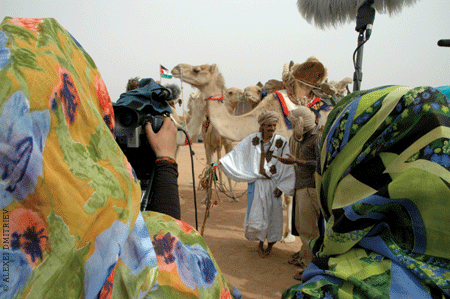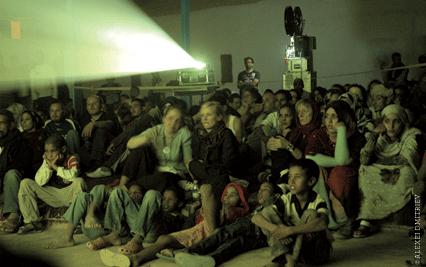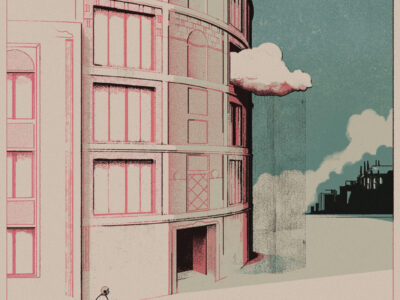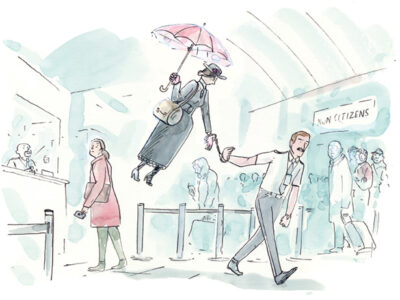
North Africa’s Sahrawi refugees don’t have a nation, but they have an international film festival.
By Alexei Dmitriev
The flies start up at 6:45 a.m. They walk on my face with impunity. There are no birds to chase them. There are no birds because there are no trees to nest in. Aside from a funny-looking beetle that comes out at night, when it can avoid scorching its legs in the hot sand, I have not seen any native wildlife. After all, the Sahara is not known to welcome life at all.
The flies have come because of the camels, goats, and sheep that make life a little better for 40,000 humans who should not have to be here. Yet not only are they here, but as if to defy the unfriendly odds of survival, they run an international film festival.
A visitor is hard-pressed to find any vestiges of the glamor that will fill Cannes a few weeks after the last screening here. Oliver Stone was expected, but could not make it. Javier Bardem, Penelope Cruz, and Pedro Almodovar attended during previous years, but not this one. A red carpet was unfurled in the sand for Victoria Abril, yet Dakhla remains what it is: a desolate settlement for refugees from Western Sahara, who are known as the Sahrawi, on the desert plain of southwestern Algeria, 110 miles away from the nearest town, Tindouf.
Undisturbed by paparazzi, two goats happily chew on a piece of paper while a camel nibbles at their droppings. The call for evening prayer rolls over children playing soccer, over a butcher shop with its future offerings corralled in front, over beaten-up cars churning sand on the main square. But when the night falls and the wind dies down, hundreds of people emerge from mud-brick houses and tents. They sit on mats in the sand in front of a trailer parked sideways and watch films projected on the attached screen. Films do not start on time, soundtracks are augmented by lovelorn camel calls, and the generator may conk out a few times each night, but these are minor inconveniences for people who have been living in exile for the past 35 years.
Comforts in the desert are few. In late April, daytime temperatures hover above the 100 degree mark. I need water, about six liters every 24 hours. I pee only once a day, and my skin is dry even after a jog. (“Where are you going?” ask two Sahrawi women for whom running around without purpose in the Sahara is beyond comprehension.) All this liquid goes into dry air patrolled by sandstorms that usually sweep by in the early afternoon, darkening the sky so that one can stare at the sun and not squint, as if it were the moon.

In Dakhla you can’t escape the heat. Forget air conditioning—there aren’t even any fans, as the camp lacks an electrical grid. Wealthier refugees use solar panels to power satellite TVs; others rely on a car battery to feed a flickering light bulb. Water is trucked in and pumped into a huge tank overlooking the camp. From there it flows to distribution cisterns, from which donkey carts travel to fill water bags that serve two or three families. Two non-potable gallons are enough for a morning bath.
Bottled drinking water and all foodstuffs are brought in from Tindouf. The people of Dakhla depend almost exclusively on humanitarian aid for survival: three pounds of potatoes per person per month, same amount of onions and zucchini. “Last year the rations had been reduced by one third. We were told it was because of the economic crisis in Europe,” remarks Guiha, a mother of eight who is hosting me in the family’s tent.
Guiha’s daughter volunteers as a nurse in the camp hospital and one day I go with her. It is built like a medieval fortress: a narrow passage zigzags from the entrance to an inner courtyard. I pop my head in a door that says Odontologia.
Inside, a man named Ali Mohammed smiles, making his beard move in a funny way. “Most people here still use wooden sticks called mezouacinstead of tooth brushes—this way you do not need water to clean your teeth,” he says. On his table, extracting forceps lie next to commentaries on the Koran. “I was trained in Cuba as a civil engineer,” he tells me. “When I returned to Dakhla I found work in the pharmacy. Then a Spanish dentist came and trained me for a few weeks. There was no one else who could do dentistry here. In the hospital we have plenty of nurses, but only one certified doctor.”
Like three other refugee camps closer to Tindouf, Dakhla is named after a town in the Sahrawis’ homeland, which has been occupied by Morocco since 1975. That’s where their relatives and the hopes of statehood reside, behind a 1,200-mile long “Wall of Shame” Morocco built to keep 165,000 refugees out. The Sahrawis are used to the heat, the adversity, the 60 percent rate of anemia among their children, but the despondency of waiting for a solution wears them down much harder. The seventh annual FISAHARA festival is meant to provide relief from the tedium of camp life, to conduct workshops on filmmaking, and to bring the world’s attention to the plight of the Sahrawi people.
In 1884 Western Sahara became a colony of Spain. In 1975, when the Spanish started packing with a push from Polisario, the Sahrawi independence movement, Morocco and Mauritania moved to grab the territory—which contains about a quarter of the planet’s known phosphate deposits. Their claims were rejected by the International Court of Justice in the Hague, which supported the Sahrawis’ right to self-determination through a referendum. Nevertheless, Spain signed an accord with Morocco and Mauritania giving the two countries authority over the territory until the referendum could be held. Polisario reacted by announcing the creation of the Sahrawi Arab Democratic Republic (SADR) and starting a military action. Mauritania withdrew in 1979, but the war with Morocco lasted until 1991, when the UN orchestrated a ceasefire with the promise of a referendum. “Everybody thought it was a sure thing,” Hach Ahmed, the SADR minister for relations with South America, remembers. “People in the camp tore down the tin roofs to make boxes for their belongings.”
The referendum and homecoming are still in limbo.
The world media has kept the conflict off the front page: it does not stem from a clash of conflicting faiths, has no political heavyweights, and hundreds of innocents are not dying in terrorist attacks. The presence of UN peacekeepers and other NGOs, primarily from Spain, has prevented the replication of Rwanda- or Sudan-scale humanitarian disasters. Algeria has a strong army and backs Polisario. More than 80 countries recognize Western Sahara as a sovereign state (the U.S. and Western European democracies are not among them), but those that support it most vociferously—Venezuela, Cuba, Libya, South Africa, and Algeria—get little attention as they have track-record issues of their own. In the meantime, Western Sahara remains the last African colony.
Between noon and 5 p.m. the already slow life in Dakhla stops altogether; everybody reclines on carpets and naps. Ahmed Fahl Ibrahim brings out tea. Ahmed spends one month in the Polisario army, patrolling the Wall of Shame, and one at the camp. He is 26 years old, was born in the occupied territory, and has not seen his family for seven years. “We are tired of waiting,” he says. “In the occupied territories, our people are discriminated from the school desk up. In 1991 we agreed to resolve the issue diplomatically, but it now feels like we are being punished for that.” He pours the tea from the kettle into small glasses from a great height. Then he tips the steaming liquid from glass to glass, again and again, and finally offers us foaming sweet tea. Quickly drained, the glasses are returned, washed, and a second round is begun for a total of three. If you’re offered a fourth glass you’ve probably stayed a tad too long. But what’s too long when preparing tea seems like an ingenious way to fill in the time?
In the evening, when the heat subsides, a team of festival guests plays a soccer match against the Dakhla squad. We lose 4 to 1. “Take it easy,” says Guiha’s son Ali, offering consolation. “While you live a full life and make movies, we have all the time in the world to practice.” Ali also studied in Cuba, but there is no work for him in the camp. “Should have studied subversive warfare instead of computers,” he jokes.
It is getting harder for the Polisario administration to reign in growing militancy among the young Sahrawis. “The young people did not experience the horrors of war, and see in it a way out of monotonous inactivity and the futility of non-violence,” says Hach Ahmed. “That is why the festival has such a spiritual significance for us. In the place of missing political support, they gain a cultural one which is even stronger.”
The festival is not the only window to the world for the two generations that have been born in the camps. Most kids older than 12 continue schooling in boarding schools in Algeria and Libya. Some get university degrees abroad. Many earn money in Spain or Mauritania to open stores and cafes in the camps. To young Sahrawis, Spain often feels closer than the country behind the Wall of Shame that they call their own.
On the last day, participants in the directing seminar—who five days ago handled video cameras for the first time—screen short clips that they filmed at the entrance of the women’s center. In one a man is shown bringing in some boxes, then a pile of used-up packing materials, then the camera climbs to show an empty flagpole and comes back down to a stop-frame of an open door in a white wall. James Duff, a New York film-school professor, asks the students to offer their interpretation of the auteur’s intention. “This is a film about our life,” says a pretty girl in a yellow-reddish mehlafa wrap-around. “We are being helped by those who do not understand what we really need. We do not know what country we live in. We could have walked away from here, but then our people will disappear … like water into the sand.”
Alexei Dmitriev G’88 is a documentary filmmaker who lives in Potomac, Maryland.




